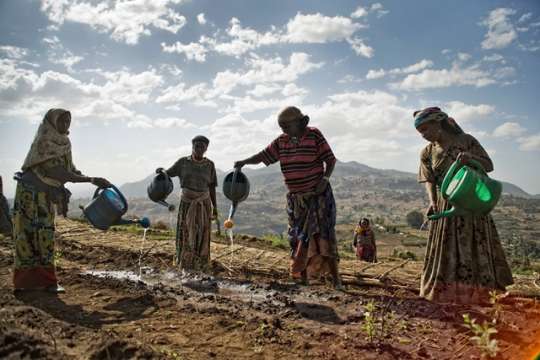African Governments Must Prioritise Agro-Ecology In Climate Change Strategies
- Home
- African Governments Must Prioritise Agro-Ecology In Climate Change Strategies

African Governments Must Prioritise Agro-Ecology In Climate Change Strategies
 Forty-five civil society organisations (CSOs) in agro-ecology and environment have called on African governments to place agro-ecology at the centre of their climate change adaption strategies to protect their citizens.
Forty-five civil society organisations (CSOs) in agro-ecology and environment have called on African governments to place agro-ecology at the centre of their climate change adaption strategies to protect their citizens.
They urged the governments to transition their current agriculture and food production system to agro-ecology and advance a strong argument to commit industrialised and wealthy countries to provide adequate climate financing for the implementation of climate adaptation and mitigation plans.
The CSOs comprise young environmental activists and women farmers’ movement who said the theme; “Climate Action in Africa: A race we can win” was appropriate to the extent that African governments paid attention to the most appropriate and urgent climate actions.
They made the call in a joint statement at the 2019 Africa Climate Week, held in Accra from March 18 to 22.
“It is common knowledge that Africa is one of the most highly vulnerable regions to the effects of climate change, and we have seen in the last week in Zimbabwe and Mozambique people are getting hard hit and the pattern will continue and worsen. Yet it is evident that the Continent has contributed little to this global problem,” the statement said.
“Considering that African countries have very low contribution to the current climate crisis, yet it is adversely affected by it, it will be strategic for the governments of the Continent to leave the discussion table speaking a ‘common language’ in their climate actions.”
“This common language should not fall short of placing stronger emphasis on climate change adaptation for protecting its citizens, transitioning its current agriculture and food production system to agro-ecology as the most appropriate model for agriculture.
“It should not also fall short of advancing a strong argument to commit industrialised and wealthy countries to provide adequate climate financing for the implementation of its adaptation and mitigation plans.”
The statement said rural communities who depended on farming for food and income were, especially, vulnerable to climate change.
Farmers who depended on predictable rainfall patterns were harvesting lower yields due to poor soil quality, pest invasions, droughts, floods and drying up of water in many communities.
The statement said in most cases, those trends hit women and girls the hardest. Women farmers face discrimination when they tried to access finance to make the investments needed to cope with the impacts of climate change.
Climate change effects also increases the burden of women unpaid care work and further devastate their ability to cope with the phenomenon.
Women who lacked fixed property to use as collateral security were often turned away from accessing bank loans for any meaningful investment in agriculture, the statement said.
It said global warming was always increasing at an exponential rate and scientists were warning that, “We have less than a decade, and that considerable efforts are required to keep global temperatures as close to 1.5° above preindustrial levels as possible, to avert a looming global climate catastrophe.
“Thus, requiring all countries of the world to honour their fair share in reducing greenhouse gas emissions as their contribution to climate change mitigation through their implementation of the Paris Agreement, yet unfortunately, the Paris Rulebook falls short of compelling governments to decrease emissions in line with their fair share.”
It said due to different levels of emissions and capacity to fiancé the negative effects of climate change, countries, and more especially those with high emission levels, must be guided by the principle of equity in order not to accept or take upon themselves an undue or disproportionate burden for climate change mitigation.
“According to the principle of equity, a country’s fair share of contribution to climate change mitigation should be based on its history of industrialization and its economic strength.”
In this regard, therefore, the more industrialised countries and economic powers such as the United States of America, Japan and other European countries should take on more of the responsibility for mitigation,” the statement said.
“There is strong and factual evidence that agro-ecology systems, as nature-based solutions … build climate resilience, and multiple social, cultural and environmental benefits for women, youth and men in both rural and urban communities.”
Source: GNA
Classic Ghana
Classic Ghana brings you into a fun world of arts, entertainment, fashion, beauty, photography, culture and all things in between. Let’s explore these together!


